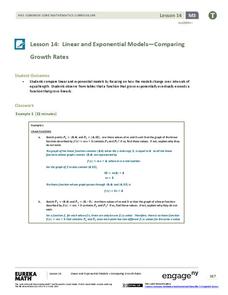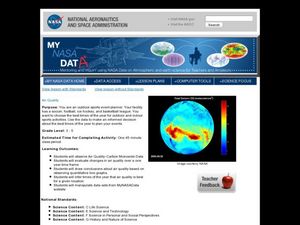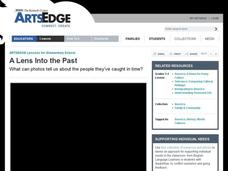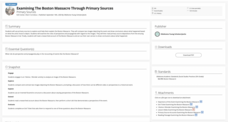EngageNY
Linear and Exponential Models—Comparing Growth Rates
Does a linear or exponential model fit the data better? Guide your class through an exploration to answer this question. Pupils create an exponential and linear model for a data set and draw conclusions, based on predictions and the...
CPALMS
Analyzing Vonnegut's View of the Future and His Commentary on the Present in Harrison Bergeron
Kurt Vonnegut's short story "Harrison Bergeron" engages adolescents with its theme about the dangers of complete societal equality. Learners complete a graphic organizer to track literary elements in the story, as well as an inference...
University of Colorado
Are All Asteroids' Surfaces the Same Age?
Did you know scientists can tell the age of an asteroid by looking closely at its craters? This final lesson of a six-part series focuses on two asteroids, Gaspra and Ida, in order to demonstrate the concept of dating asteroids. Scholars...
Redefining Progress
Have and Have-Not
Is there a correlation between a country's wealth and the extent of its ecological footprint? What exactly constitutes an ecological footprint, and how does one country stack up against the rest? This is a unique instructional activity...
Curated OER
Archaeological Inquiry
Students describe what they see as they observe an "artifact". They draw conclusions based on the information gathered to identify what the artifact might be used for and determine how old it might be.
Curated OER
Identify Cause and Effect
Students listen to a story about school in a one-room schoolhouse. In this cause and effect lesson, students create a Venn diagram to find the similarities and differences in schools then and now. Students discuss how past events help...
NASA
Biology Training Conclusion
Gravity is just one consideration when determining human habitability on a new planet. The lesson connects four different units and starts with connecting the various systems: planetary systems, human body systems, etc. After scholars...
Curated OER
Deep Convective Clouds
Students observe clouds. In this deep convective clouds lesson, students analyze cloud data recorded over one month and draw conclusions based on results. Students predict "Thunderstorm Season" and prepare to defend their decision using...
Curated OER
Air Quality
Learners observe air quality and monoxide data. In this air quality lesson, students draw conclusions and manipulate data from a one year period on changes in air quality.
Curated OER
Author's Opinion
Students complete a worksheet. In this author's opinion lesson, students learn how to determine an author's opinion when it is not explicitly stated in the text. Students answer fact and opinion questions and use them to draw...
Roald Dahl
The Twits - The Twits Get the Shrinks
Turn readers into investigative journalists. The 11th and final lesson that accompanies The Twits by Roald Dahl asks the question "What happened to Mr. and Mrs. Twit?" The lesson uses mind maps and group discussion to help answer the...
Stanford University
King Philip's War
King Philip's War was the crescendo of a violent period between the Pequot and English colonists. Using documents from English settlers, including a contemporary report on the conflict, learners explore the little-known period. They then...
Curated OER
A Lens into the Past
Explore the history of immigration through photographs. Scholars will view and discuss photographs depicting the culture and lifestyle of late 19th and early 20th century immigrants. They take pictures of current examples of culture in...
Curated OER
Playing Historical Detective: Great Grandmother's Dress and Other Clues to the Life and Times of Annie Steel
Students draw conclusions about an mystery person based on documents and artifacts provided. In this drawing conclusions lesson, students become detectives by reading and analyzing evidence provided. This lesson includes information on...
Curated OER
The Westward Movement
Students study the westward movement through examining stamps. In this westward movement lesson plan, students draw conclusions, determine cause and effect relationships and examine the westward movement of the United States by...
Nancy Fetzer's Literacy Connections
Expository Paragraph
Upper elementary and middle school writers learn how to craft an expository paragraph by following the six steps detailed in a 48-page instructional guide. Learners learn how to write six different types of informational paragraphs: to...
Curated OER
Call It a Hunch
Give young scholars a chance to practice making inferences after reading the book Through My Eyes by Ruby Bridges. They confirm whether or not their conclusions are true, have a class discussion, and then independently complete an...
EngageNY
Angle Sum of a Triangle
Prove the Angle Sum Theorem of a triangle using parallel line and transversal angle relationships. Pupils create a triangle from parallel lines and transversals. They find angle measures to show that the angles of a triangle must total...
K20 LEARN
The Sirens: Is It a Bird or Is It a Fish?
Fish, fowl, foul fish, or foul fowl? Just what is a siren? Young scholars listen to a video clip and draw what they imagine when they hear the word "siren." After watching several videos depicting sirens, class members read "The Sirens'...
Center for History and New Media
Slavery and Free Negroes, 1800 to 1860
What was life like for enslaved and free black people before the American Civil War? Explore the building tension between states and the freedom of individuals with a thorough social studies lesson. Learners of all ages explore primary...
Council for Economic Education
Unemployment Data: Is the Economy Healthy?
The United States will never see a time when the unemployment rate hits 0%. Why? Scholars research economic data to uncover clues hidden in the unemployment rate at any given time. A short video as well as research activities help...
Statistics Education Web
Consuming Cola
Caffeine affects your heart rate — or does it? Learners study experimental design while conducting their own experiment. They collect heart rate data after drinking a caffeinated beverage, create a box plot, and draw conclusions. They...
Council for Economic Education
Inflation Data: Is the Economy Healthy?
What stories do current trends tell about society, fashion, and the future? Scholars investigate the concept of inflation and its impact on the future of the American economy. They compile current economic data to determine the level of...
K20 LEARN
Examining The Boston Massacre Through Primary Sources
The Boston Massacre is the focus of a instructional activity that explores primary sources. Scholars examine two primary source images and discuss the different perspectives on the historical event. After groups read a researched...

























